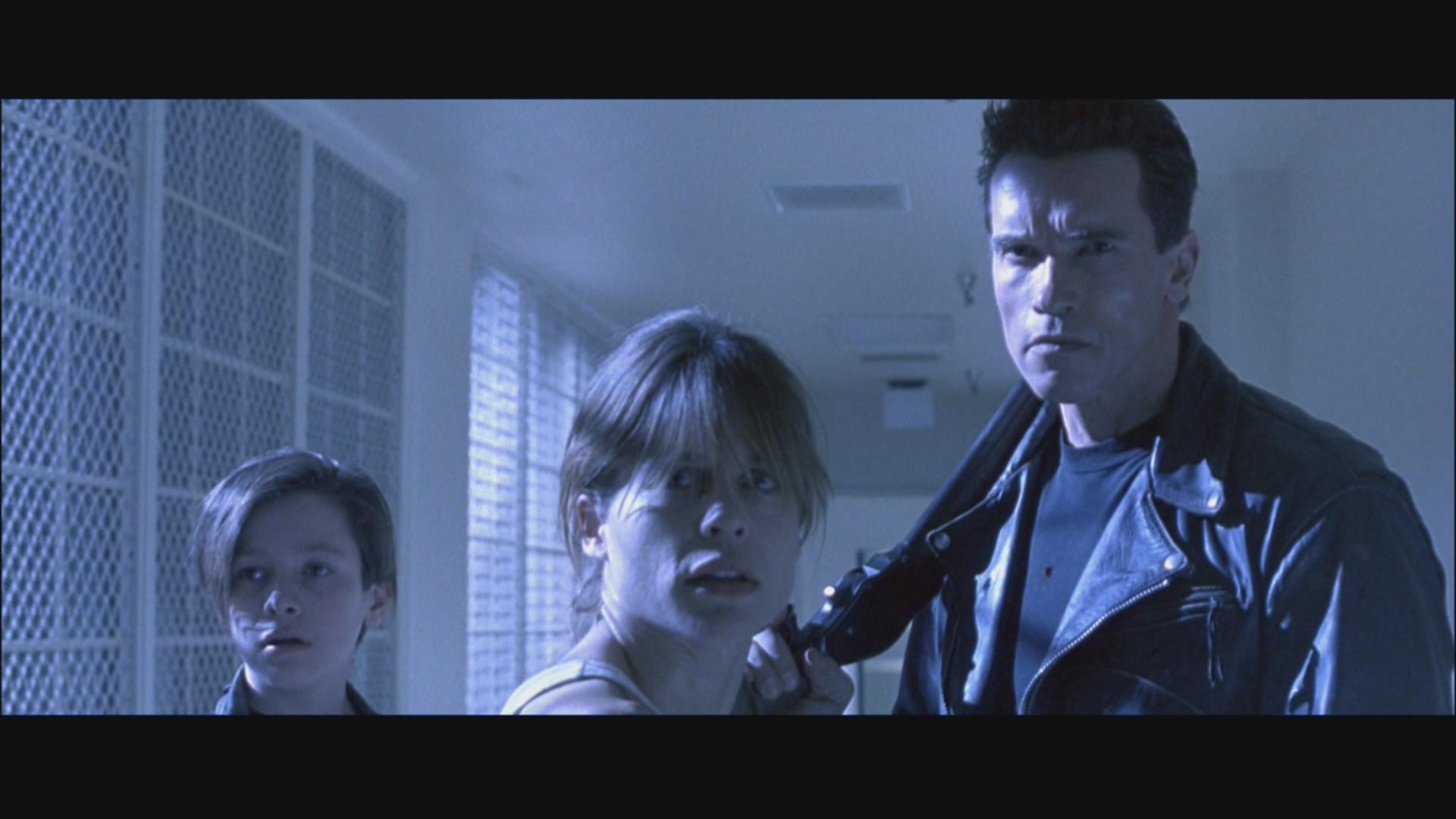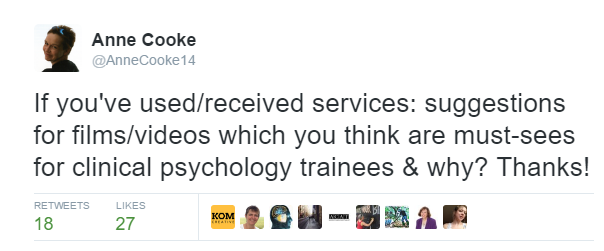Maddog and Anne Cooke
One of the things we’re proud of on the Clinical Psychology Doctorate here at Salomons is our teaching unit on service user and carer perspectives. One of the speakers recently had to cancel at short notice. I (Anne) had the idea of showing the trainees a service user/survivor-recommended film instead, and then discussing the issues raised. As I often do, I turned to Twitter for suggestions.
And boy did I get them! So many that they could keep me occupied for the next year. To help organise and review all this material I turned to service user/survivor activist and ‘half-dog’ Twitter stalwart, Maddog (@maddoggie2) whom I’ve known for a long time and who is currently mentoring a trainee research project with me. A self-confessed film buff who had made many of the suggestions, she has generously collected together everyone’s recommendations and provided her own commentary on each.
Here they are. What’s missing? What have the good folk of Twitter missed? Have they picked something you love? Or that you hate? We’d love to hear from you in the comments below.
Films and videos recommended by service users and survivors on Twitter.
Reviewed by Maddog
Cathy Come Home. Ken Loach from the 1960’s. A seminal film about homelessness.
Family Life. Ken Loach’s again, this time from the 1970’s. A film about a young woman’s struggle with parental pressures to accept her lot as a working class woman. Her subsequent descent into the psychiatric system ultimately destroys her.
I, Daniel Blake. Ken Loach is still going at the age of 80, and his most recent film (out this month) depicts the brutal reality of today’s welfare system. A must-see for every health and social care professional.
In the Real. Produced by the Bristol Hearing Voices Network, this film shows the gritty reality of living with a diagnosis of psychosis, schizophrenia or schizoaffective disorder. A refreshing change from sanitised ‘recovery’ stories. My joint top recommendation with Breakdown (below).
Shine. Geoffrey Rush’s beautiful portrayal of parental and educational pressures leading to madness. It respects and honours the experience, offering clear context.
Gaslight. A 1940’s film about a woman whose husband slowly manipulates her into believing that she is going insane, for his personal gain (it would resonate with aspects of the Helen and Rob storyline in The Archers). This film gave its name to the phenomenon of ‘gaslighting’.
Frances. A film based on the real life story of the 1930’s movie star Frances Farmer who refused to conform to parental and film studio expectations of women, and ended up being forcibly hospitalised.
Terminator 2: Judgement Day. An unexpected choice maybe but bear with me. The second film in the Terminator series: a cyborg attempts to kill the future leaders of the human resistance against a computer/machine takeover of the world: a mother and her son. A second cyborg attempts to save them. The key scenes much loved by survivor activists involve a disbelieving psychiatrist whose scales fall from his eyes when he is confronted with the reality of the mother’s story. She also breaks his arm and sticks a needle in his neck before making an epic escape from a high secure hospital. The central message for mental health workers is: believe what your patient says to you or that’s what could happen. I’d be willing to demonstrate with any willing ‘volunteer’!
Life is Sweet. Mike Leigh’s funny and poignant exploration of family life with one member struggling with bulimia in the aftermath of life-threatening anorexia.
An Angel at my Table. True story biopic by Jane Campion about the life of writer Janet Frame, showing her descent into long hospitalisations, and her ultimate survival.
The War Zone. Tim Roth’s 1999 directorial debut with a hard hitting drama portraying sexual abuse in a family.
Ring (Japanese edition). A psychological horror film notable for a scene depicting a character moving from one reality to another. A woman on the TV actually climbs out through the TV screen. This is useful imagery in understanding what it can be like for voice hearers who experience their voices coming from the TV.
Taking over the Asylum. A highly acclaimed 1990’s TV series set in a Scottish acute psychiatric unit and focusing on the lives and struggles of the patients. The writer Donna Franceschild had direct experience which shows in the writing. One character is especially notable for a sensitive and unusually rounded portrayal of experience diagnosed as OCD.
One Flew Over the Cuckoo’s Nest. Classic film often derided by psychiatrists and nurses for ‘damaging the reputation’ of electroconvulsive therapy (ECT). However for me what’s central to the film is the portrayal of the everyday emotional brutality, seen particularly in ‘Billy’s’ storyline. Staff nurse Ratched is expertly played not as a monster, but as a person who truly believes that her monstrous actions are in the patients’ best interests.
Poppy Shakespeare. A 2008 film based on the award winning book by Clare Allan about the lives of patients in a North London mental health day hospital.
The Hours. Three generations of women connected by the Virginia Woolf novel Mrs Dalloway struggle for meaning in their lives and with mental distress and suicide.
Gattaca. A visually elegant sci-fi film set in a eugenic future where babies conceived outside of the eugenics programme are second class citizens serving the genetic elite. The film focuses on two characters struggling to find their places in society, one genetically ‘flawed’ and the other genetically ‘perfect’ but paralysed by an accident.
Sling Blade. A poignant film about a man with a learning disability released from hospital, his acceptance around an awkward community, friendship with a lonely boy and his sacrifice to protect the boy from family violence.
Requiem for a Dream. A bleak and gripping psychological drama about different forms of drug addiction.
Donovan Quick. A retelling of the Don Quixote story set in present day Scotland by ‘Taking over the Asylum’ writer Donna Franceshild.
Science and the Swastika. A television series examining science and morality during the Third Reich, and the practice of eugenics and euthanasia in Nazi occupied Europe.
Nuts. A 1980’s film with Barbara Streisand as a sex worker abused as a child, now accused of murder and fighting against an insanity plea. It’s very Hollywood but worth a view.
Asylum. 2005 Film set in the 1950’s which depicts a psychiatrist’s wife’s rebellion against gender expectations, sexual obsession and psychological manipulation by a psychiatrist played by Ian McKellen.
Good Will Hunting. Film about a young, unrecognised genius using therapy sessions to re-evaluate his past and his relationships, and to think about his future. The therapist is played by Robin Williams.
These are films I’m unfamiliar with so can’t review but were recommended by members of the Recovery in the Bin group:
Silver Linings Playbook [Editor’s note: this is one we’ve considered in detail in the past.]
Garden State
Days of Wine and Roses
Fight Club
Son of Saul
Melancholia by Lars von Trier
Birdman or the Unexpected Value of Ignorance by Alejandro G. Iñárritu
Jeanne Dielman, 23 quai du Commerce, 1080 Bruxelles by Chantal Akerman
Солярис/Soljaris (Solaris) by Andrej Tarkovskij
Other films
Beyond popular (and broadly mainstream) films like the ones above, there are also a large number of films from a variety of other sources available on platforms like YouTube and Vimeo. Here is a selection of ones I’d argue are essential and should be part of the core curriculum in mental health education and training. Be warned, some of them take strong positions and really aren’t comfortable viewing.
This Time it’s Personal. Psychocompulsion & Workfare
Protest & Intervention. Work cure therapy for benefit claimants with mental health disabilities
Controversy over Islington ‘Job’s on Prescription’ scheme
A talk by Lynne Friedli of ‘Boycott Workfare’
Mike Sivier: DWP Staff Asking Sick And Disabled ‘Why Haven’t You Killed Yourself?’
Restraint by CanDo Films
https://www.youtube.com/watch?v=U4jJS3o2Th0
Lynne Friedli: What’s wrong with recovery?
Lynne Friedli talks about the use and abuse of psychology by the DWP
The Divide A political documentary about inequality. Access code CROWDFUNDERONLY.
We’re not Mad We’re Angry. Made in the 1980’s, this is still the only film produced for mainstream television where survivors had full editorial control.
From Anger to Action A follow-up to We’re Not Mad We’re Angry.
Breakdown. A seminal, award winning Capital Radio portrayal of two people’s experience of psychosis. My other joint top recommendation.
Fish on a Hook. An animation of agoraphobia narrated by the person experiencing it.
Unlabelling Borderline Trauma. Debra Marshall
Legendary US activist Judy Chamberlin at the World Psychiatric Association Dresden
Pat Deegan’s Amazing Story. Pat Deegan on recovery
Exposing Psychiatry – Only Smarties have the answer (8 parts)
Aidan Shingler’s creative puppetry exploring his experience in psychiatry:
https://www.youtube.com/watch?v=-T0EderenDU
https://www.youtube.com/watch?v=zbBytj8eaZo
https://www.youtube.com/watch?v=_7thJ2ekYWw
https://www.youtube.com/watch?v=45XLHUezdfQ
https://www.youtube.com/watch?v=X7CfcKvHeP4
https://www.youtube.com/watch?v=ejRnUak5lJI
https://www.youtube.com/watch?v=aWZIt0xqSKI
https://www.youtube.com/watch?v=jCTmUdEceqc
Experts’ panel and an interview with Prof. Peter Fonagy|Borderline Personality Disorder. Hebrew University of Jerusalem. Interesting point at 3 minutes.
Rethinking BPD: A Clinician’s View Nine minutes in Marsha Linehan refers to how she chose the diagnosis of ‘Borderline Personality Disorder’ for her research.
 Discursive of Tunbridge Wells
Discursive of Tunbridge Wells John McGowan
John McGowan 8717
8717




No Mulholland Drive? An omission guys. One of the best depictions of the troubled subconscious (through a dream) in the history of fiction. As this rather off beat review convinced me. http://birthmoviesdeath.com/2012/03/04/film-crit-hulk-smash-hulk-vs-the-genius-of-mulholland-drive
It’s definitely not for everyone, but I think Beyond the Black Rainbow is brilliant for a subjective experience of escaping woozy, drugged-up powerlessness and abuse.
I find “The Eternal Sunshine of the Spotless Mind” a very thought provoking watch.
‘Ordinary People’ directed by Robert Redford is a compelling film about a young man’s breakdown and his family’s turmoil after he had lost his brother in a boating accident.
Lars and the Real Girl
The Fisher King